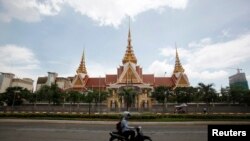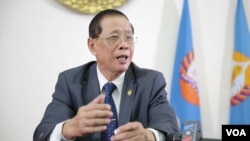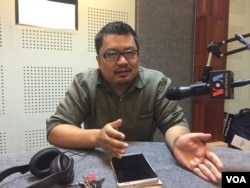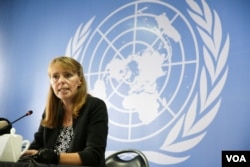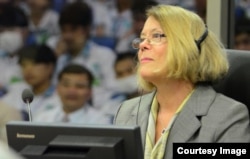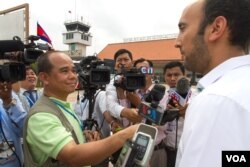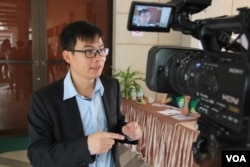Cambodia’s parliament is set to pass an amendment to a law governing political parties that would lead to the dissolution of opposition groups if they receive funding from abroad or if their leaders have a criminal record.
The Cambodia National Rescue Party’s 55 MPs will boycott Monday’s session at the National Assembly, leaving the ruling Cambodian People’s Party’s 68 lawmakers unopposed.
The amendment to the 1997 Law on Political Parties was requested by Prime Minister Hun Sen in late January, prompting parliament to fast-track the legislation.
It will change the law to prohibit people with criminal convictions from holding senior positions in political parties and includes penalties for receiving foreign funding, “causing secession” and “subverting liberal multiparty democracy.” It grants the power to dissolve parties that break the rules to the Supreme Court, an institution critics say is a political tool of the ruling party.
The opposition responded by saying that the proposed amendment was “too rushed” and “unnecessary”. The CNRP has largely depended on financial support from the Cambodian diaspora in the United States, France and other countries, to fund its activities in the past.
Sok Eysan, CPP spokesman, said the law was not aimed at the CNRP. However when asked what crimes were considered serious enough to warrant the dissolution of a political party he referred to former CNRP leader Sam Rainsy, who was convicted of defamation against former foreign minister Hor Namhong.
He added that members of the Cambodian diaspora were not included in the definition of foreign funders.
Ou Virak, a Phnom Penh-based analyst who founded the Future Forum think tank, said the wording of the new law was vague and open to interpretation.
“Incitement that would lead to national disintegration is problematic since it depends on anyone’s judgment,” he said.
There should, Virak said, be no party dissolution if just an individual politician commits a crime. “I think it is unfair for the party,” he said.
The decision to amend the law came amid heightened political tensions and threats against the opposition, which led Rainsy to take the unexpected step of stepping down as CNRP leader last week.
Virak said the tensions were hurting investor confidence, adding that the pattern of tensions in the run up to elections had become “a bad habit for Cambodia.”
The U.N. special rapporteur on human rights in Cambodia, Rhona Smith, expressed concerns over the speed with which the proposed amendments were brought to a parliamentary vote.
“I would hope that the National Assembly undertakes a human rights analysis of the draft law before moving to adopt it,” she said.
“With commune/sangkat elections in June, and the general election next year, changes in eligibility of political party leaders and in the registration and operation of political parties are troubling,” she added.
Elizabeth Becker, a veteran journalist who reported from Cambodia in the 1970s, told VOA Khmer that the proposed amendments appear to be an attempt to ensure victory in the forthcoming elections.
“This appears to be Hun Sen's final move in his drive to create a single party state. If it goes through as envisioned there would be no independent opposition,” she said.
“There is no question that Hun Sen is out to destroy the opposition. If he behaves as he has before he will still hold elections in order to appear democratic. The CPP would be throwing away the last vestige of a true democracy.”
Sophal Ear, an associate professor of diplomacy and world affairs at Occidental College in Los Angeles, said that the political situation is the “worst setback for Cambodian democracy” since the country’s first modern democratic elections in the early 1990s.
“We’ve gone through so much, but never to the point of dissolving the opposition. Once that happens, Cambodia will enter uncharted waters,” he said.
“If the opposition is dissolved, why bother having elections at all?”
Cambodia will hold commune elections in June and is scheduled to hold a general election in July 2018. The CNRP took 55 seats to the CPP’s 68 in the 2013 election, the results of which were hotly disputed.
Jay Raman, U.S. Embassy spokesman, said that there should be political participation and dialogue before any amendment to the law.
“Any amendments to the Law on Political Parties that decrease political participation and dialogue would be counter-productive and contrary to the desires of the Cambodian public,” he said.
“Prior to considering new legislation, we encourage the Cambodian government to consult with civil society and international partners to examine the best practices in electoral reform.”
Asked what the opposition could do in response to the moves by the CPP, journalist Becker said: “The opposition knows what to do: Resist as if Cambodia's democracy depended on it. Resist nonviolently but resist.”
She called for international donors to apply pressure on the government.
“International donors should publicly denounce this move immediately. It doesn't matter whether the denunciation has an immediate impact on the Hun Sen government,” she said.
“What matters is that the donors stand up for the Cambodian people whom they have pledged to support and for the principles they espouse. Then they will have to consider how to support Cambodians without underwriting the government.”
Chheang Vannarith, a regional analyst, told VOA Khmer via email that it was up to Cambodians to define their political future.
“Without reconciliation, mutual respect, Cambodia will lose [the] opportunity to catch up with regional countries. We need to together respect the constitution, and together work for the nation.
“I am afraid that at this stage we are entering a new dark side of Cambodia's history which is determined by hatred, revenge, distrust, and violence,” he said.




